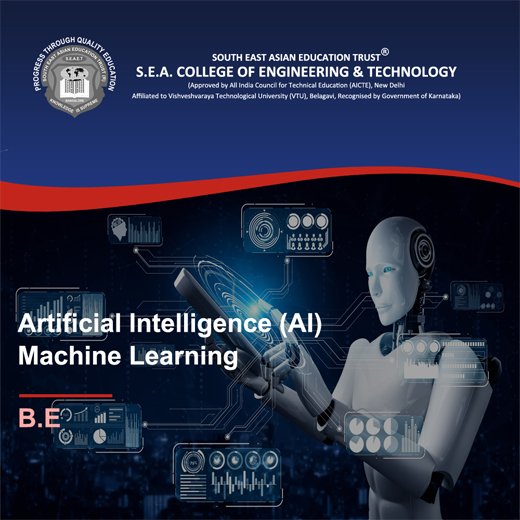Programme Education Objectives (PEOs)
The graduates of AI and ML program will be able to:
Excel in Professional career by applying the knowledge of Artificial Intelligence and Machine Learning and engineering principles for research and societal needs.
Pursue higher education and multi-disciplinary research in AI and ML domains.
Adapt to technological advancements by engaging in lifelong learning with leadership qualities, professional ethics and soft skills.
Programme Specific Objectives
Skills: The ability to comprehend, analyse, design, implement and conduct inter-disciplinary research in the emerging areas of Artificial Intelligence, Machine Learning, Deep Learning, Natural Language Processing, Computer Vision, Data Analytics and Cloud Computing.
Problem Solving Skills: The ability to apply the techniques of Artificial Intelligence and Machine Learning and adopt standard software engineering and professional practices to evolve novel as well as optimal solutions.
Ethics and Career Development: The ability to learn and adapt to the principles of universal human values, teamwork, and ethical practises in order to foster an entrepreneurial spirit and the pursuit of higher levels of knowledge.
Programme Outcomes (POs)
Engineering Knowledge:
Excel in Professional career by applying the knowledge of Artificial Intelligence and Machine Learning and engineering principles for research and societal needs. Also, alignment and spacing after each PEOs and PSOs can be made uniform.
Problem Analysis:
Identify, formulate, review research literature and analyze complex engineering problems reaching substantiated conclusions using first principles of mathematics, natural sciences, and engineering sciences.
Design/Development of Solutions:
Design solutions for complex engineering problems and design system components or processes that meet the specified needs with appropriate consideration for the public health and safety, the cultural, societal and environmental considerations.
Conduct Investigations of Complex Problems:
Use research based knowledge and research methods including design of experiments, analysis and interpretation of data and synthesis of the information to provide valid conclusions.
Modern tool usage:
Create, select, and apply appropriate techniques, resources, and modern engineering and IT tools including prediction and modeling to complex engineering activities with an understanding of the limitations.
The engineer and society:
Apply reasoning informed by the contextual knowledge to assess societal, health, safety, legal and cultural issues and the consequent responsibilities relevant to the professional engineering practice.
Environment and sustainability:
Understand the impact of the professional engineering solutions in societal and environmental contexts, and demonstrate the knowledge of, and need for sustainable development.
Ethics:
Apply ethical principles and commit to professional ethics and responsibilities and norms of the engineering practice.
Individual and team work:
Function effectively as an individual, and as a member or leader in diverse teams, and in multidisciplinary settings.
Communication:
Communicate effectively on complex engineering activities with the engineering community and with society at large, such as, being able to comprehend and write effective reports and design documentation, make effective presentations, and give and receive clear instructions.
Project management and finance:
Demonstrate knowledge and understanding of the engineering and management principles and apply these to one’s own work, as a member and leader of a team, to manage projects and in multidisciplinary environments.
Life-long learning:
Recognize the need for, and have the preparation and ability to engage in independent and life-long learning in the broadest context of technological change.













